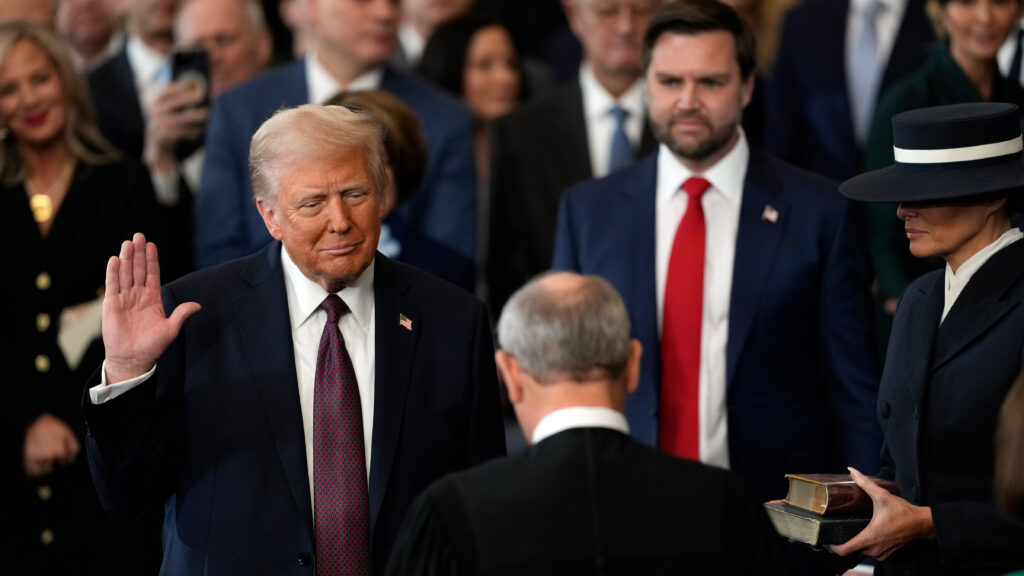Donald Trump USA 2025: The Impact and Legacy of a Controversial Second Term
Introduction
Donald Trump returns to the political stage in Donald Trump USA 2025, reshaping the national landscape. In this article, we analyze his political, social, and cultural influence based on the latest factual information. We aim for a balanced, analytical view of his second term.

The Return of Donald Trump to American Politics
Trump was inaugurated for his second term on January 20, 2025. Within days, he established the Department of Government Efficiency (DOGE)—in partnership with Elon Musk—and issued sweeping executive orders aimed at downsizing federal agencies and eliminating diversity, equity, and inclusion (DEI) programs. On July 4, 2025, he signed the landmark One Big Beautiful Bill—a massive reconciliation act containing tax cuts and spending provisions—marking his most significant legislative win to date.
Political Impact in 2025
Transformative Legislation and Party Dynamics
The One Big Beautiful Bill extends Trump’s 2017 tax cuts, eliminates taxes on tips and overtime, increases border and defense spending, and slashes Medicaid, SNAP benefits, and clean energy incentives. The bill narrowly passed both chambers—218–214 in the House and 51–50 in the Senate, with VP JD Vance casting the tiebreaker vote. It is expected to add $3–4.5 trillion to the national deficit over a decade.
Consolidation of Power
Trump’s second-term agenda reflects a strong hand: control of the White House, Congress, and a 6–3 Supreme Court majority(thetimes.co.uk). His heavy influence over the GOP has deepened ideological unity, although moderate Republicans, like Senator Thom Tillis, resigned in protest(newyorker.com).
Social Influence
Surge in Polarization
DOGE’s aggressive restructuring of federal agencies and removal of DEI initiatives sparked nationwide protests—including 2,085 anti-Trump demonstrations in February, many targeting Elon Musk’s role. Public opinion remains divided: 39% disapprove of DOGE, while 29% support it.
Declining Approval
Trump’s approval ratings have fallen, with polls indicating only 29–30% support for his signature bill . His economic approval has dipped, though his core base is largely loyal.
Cultural and Media Impact
Media Strategy and Cultural Policy
Trump has leveraged national media and orchestrated a “culture war”—restricting public broadcasting access, accelerating military parade initiatives, and even suggesting a UFC event at the White House. He is positioning his administration as a patriotic, traditionalist force ahead of America’s 250th anniversary.
Symbolism in Culture
Branding plays a powerful role—Trump’s use of “beautiful” in policy names serves as a rhetorical tool. Critics argue it reframes austerity and deficit spending in a favorable light. These symbolic gestures amplify his cultural resonance.
Future Scenarios
Election Outlook
Democrats are mobilizing around opposition to the bill, citing potential health coverage losses for millions and rural healthcare impacts. However, internal Democratic weaknesses and voter unfamiliarity with the bill’s complexities may blunt their efforts . Midterms in 2026 could decide whether this agenda endures or faces backlash.
Institutional Integrity
Experts voice concern over eroding governance norms—accusations of authoritarian drift grow louder as power centralization continues . Moves against DEI programs, expansions in executive authority, and consolidation through DOGE raise alarms about democratic resilience.
Legacy in 2025
Fiscal impact: Massive tax cuts paired with increased deficit.
Government restructuring: Major downsizing through DOGE.
Social polarization: Deep societal divisions, protests, and shifting public opinion.
Cultural influence: Rebranding of policies, ideological framing, and symbolic nationalism.
Trump’s second-term model is now shaping the broader Republican trajectory and political norms.
Final Reflections: What Lies Ahead?
In 2025, Donald Trump USA 2025 is more than a headline—it embodies a turning point in American politics. His centralized leadership, bold legislative achievements, and cultural branding define a distinctive authoritarian-leaning presidency. The resilience of U.S. democracy will be tested in the coming elections and institutional responses to his consolidation of power. The 2026 midterms will reveal whether this model solidifies or recoils.